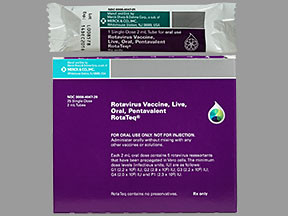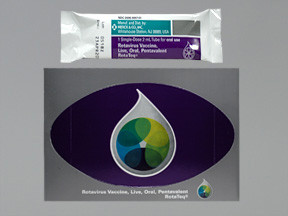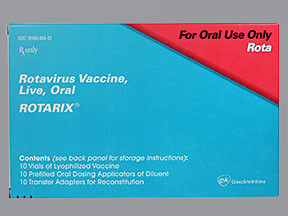ROTAVIRUS VACCINE - ORAL
PHONETIC PRONUNCIATION: (roe-TUH VYE-russ)
COMMON BRAND NAME(S): Rotarix, Rotateq
GENERIC NAME(S): rotavirus vaccine, live oral pentavalent
Uses
USES: This vaccine is used to prevent a certain virus infection (rotavirus) in infants and young children. Rotavirus can cause fever, vomiting, and diarrhea. Although nearly all children become infected with this virus before they are 5 years old, some severe cases can lead to a dangerous (rarely fatal) loss of body fluids (dehydration). Most severe cases occur in children between 6 to 24 months old. This vaccine helps the body produce immunity (protection) to prevent infection with rotavirus or to lessen the severity of an infection. Like any vaccine, it may not fully protect your child from rotavirus, and it will not help if your child already has the virus. This vaccine does not prevent fever, vomiting, or diarrhea from other causes.
How to use ROTAVIRUS VACCINE - ORAL
HOW TO USE: Read all vaccine information available from your health care professional before receiving the vaccine. If you have any questions, ask your health care professional. This vaccine is given by mouth by a health care professional, usually in 2 or 3 separate doses (depending on the brand). The doses are given at least 4 to 10 weeks apart. For the best protection, it is important to receive all scheduled doses. This vaccine is usually given at the same time as other vaccines.
Side Effects
Precautions
Interactions
Overdose
Images
Reviews
Faq for ROTAVIRUS VACCINE - ORAL
- The rotavirus vaccine is an oral vaccine that helps protect against rotavirus infection, which is a leading cause of severe diarrhea in infants and young children.
- The rotavirus vaccine contains weakened strains of the virus that stimulate the immune system to produce antibodies against rotavirus. These antibodies help fight off the infection if a person is exposed to the virus.
- The rotavirus vaccine greatly reduces the risk of severe rotavirus infection, hospitalization, and complications in young children. It also helps prevent the spread of the virus to others.
- The rotavirus vaccine is typically administered in two or three doses, starting at around 2 months of age. The exact schedule may vary depending on the specific vaccine being used.
- Most children who receive the rotavirus vaccine do not experience any serious side effects. However, some common side effects may include mild diarrhea, irritability, or mild fever.
- Yes, the rotavirus vaccine has been extensively studied and found to be safe for use in infants and young children. Serious side effects are very rare.
- While the rotavirus vaccine offers high levels of protection, it is not 100% effective. It is possible for a vaccinated child to still get infected with rotavirus, but the illness is likely to be milder than if they hadn't been vaccinated.
- Yes, the rotavirus vaccine is recommended as part of the routine childhood immunization schedule in many countries, including the United States. It is given along with other vaccines like the DTaP, Hib, and PCV vaccines.
- The rotavirus vaccine is primarily recommended for infants and young children. However, some adults with certain medical conditions may be eligible for the vaccine under specific circumstances. Consult with a healthcare professional for more information.
Disclaimer
IMPORTANT: HOW TO USE THIS INFORMATION: This is a summary and does NOT have all possible information about this product. This information does not assure that this product is safe, effective, or appropriate for you. This information is not individual medical advice and does not substitute for the advice of your health care professional. Always ask your health care professional for complete information about this product and your specific health needs.




No Reviews Yet